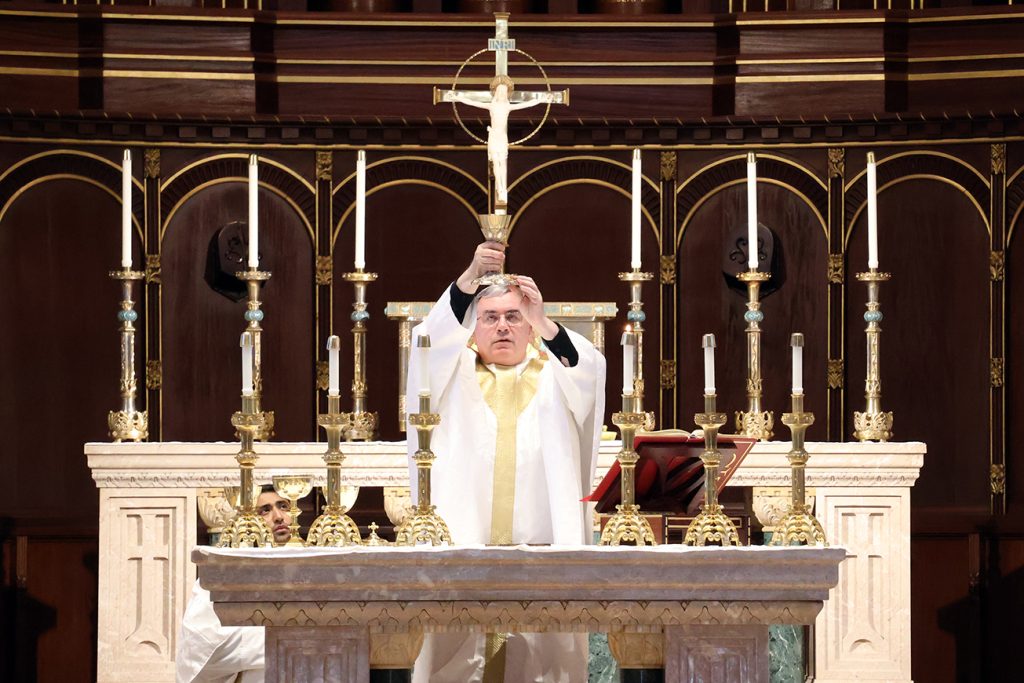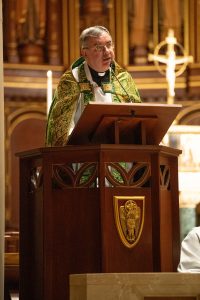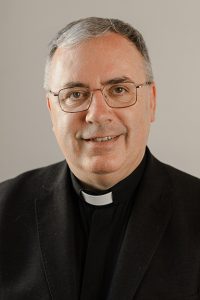Meet Rev. Andrew C. Pinsent, Ph.D.

The story below was originally published in The Athenaeum, MTSM’s bi-annual magazine. The Athenaeum is published twice a year for alumni, patrons and friends of Mount St. Mary’s Seminary & School of Theology. To be added to the mailing list, contact: Heidi Walsh at 513.233.6159 or hwalsh@athenaeum.edu.
“My first ambition as a teenager was to be an astronaut.”
Rev. Andrew C. Pinsent, Ph.D., the newest member of the priest faculty at Mount St. Mary’s Seminary & School of Theology, has not gone to space, but his background and life all around the world gives him a perspective very few can match.
Fr. Pinsent was born and raised around London in the United Kingdom, where his upbringing gave him a strong foundation in the faith.
“My parents were middle-class Catholics,” Fr. Pinsent said. “I am still grateful that my parents regarded going to Mass on Sunday as a non-negotiable. They had a strong supernatural sense of the faith. Thanks be to God!”
Following in the footsteps of his father, whose university education was in physics, Fr. Pinsent went to the University of Oxford to study in the field that would yield him Bachelor and Masters Degrees in physics and a Doctorate in particle physics.
“The 1980s was an exciting time in Europe, as for the first time since the Second World War, Europe was starting to move ahead of the United States in the study of fundamental physics,” Fr. Pinsent noted. “That is how I got involved with CERN.”
The European Organization for Nuclear Research based out of Geneva, Switzerland, CERN, was where Fr. Pinsent was involved in the DELPHI experiment, featuring the world’s most technologically advanced particle collider. In addition to being on the cutting edge of the study of physics, Fr. Pinsent also had
a front row seat to the start of something that impacts us all.
“We did invent the world wide web,” Fr. Pinsent remarked. “No one ordered its creation, but the CERN physicists were connecting their documents via hypertext links through the world wide web and it just kept getting bigger and bigger and bigger. It spread like wildfire.”
 After completing his time with CERN, Fr. Pinsent was ready for a new challenge.
After completing his time with CERN, Fr. Pinsent was ready for a new challenge.
“Although working in physics was exciting, it wasn’t really quite what I wanted to do,” Fr. Pinsent noted. “I decided I needed some business experience.”
After some time in consulting with Smith System Engineering Limited, an ad in The Economist sent him on his next adventure, to Brazil.
“I saw an advertisement for a company in Brazil called Itautec,” Fr. Pinsent continued. “They were not looking for people to work for them, but I wondered if they could use someone with a British and Anglo-American business background. I made enquiries that eventually led me to São Paulo.”
His time working for Itautec gave him an important perspective on building relationships with people.
“Brazil is the Wild West in many ways. You have to be entrepreneurial and you need to build a good deal of trust because the institutions and currencies are not as stable,” Fr. Pinsent said. “My boss in Brazil was an amazing Catholic man who never let the challenges get him down. He kept building things up and he kept developing. However, what they needed was people who could manage relationships with companies outside of Brazil, and that is where I came in.”
After four years with Itautec, he received the call.
“What struck me about working in business is that we make things that are important for our daily lives, but do not last very long,” Fr. Pinsent said. “What does last? It’s only the soul. The soul is the only real thing you can invest in that is going to last forever. If that is what God wants me to do, I better do it.”
As a seminarian for the Diocese of Arundel and Brighton in England, he was off to the Pontifical Gregorian University in Rome, where, for a man who had already learned so much, a new world of learning was opened.
“They gave me a humanities education I had never received before,” Fr. Pinsent said. “I knew how to smash particles, I knew how to write software, but no one had taught me how to think, or introduced me to the Western philosophical and theological tradition. That was quite an eye-opener.”
His time studying philosophy was only just starting.
“A professor from America named Eleonore Stump came over to Rome and gave a series of amazing lectures,” Fr. Pinsent reflected. “She invited me to do a doctorate in America, which was the last thing I was thinking of doing. I told her my Bishop decides what I do. She wrote to my Bishop; he phoned me and said I was going to America.”
One week after his ordination to the priesthood in 2005, Fr. Pinsent was heading to the United States to study with Prof. Stump at Saint Louis University, where he would be for four years before receiving his seventh university degree, a Ph.D. in Philosophy from SLU.
“She is one of the greatest Catholic philosophers in the world,” Fr. Pinsent remarked.
From there it was back to where it all started, the University of Oxford, where he would serve as the Research Director for the Ian Ramsey Centre for Science and Religion, where he would be able to use his all of his backgrounds: science, philosophy, theology and business.
“I got to work with Peter Harrison and Alister McGrath, the two directors of Ramsey Centre during my time there,” Fr. Pinsent said. “They write at a very high academic level, but they also write at a readable, accessible and entertaining level for the general public.”
His position at Oxford also saw him travel the world talking to students about science and religion.
“I have been all over the world and human nature does not change too much from country to country; the needs are very similar,” Fr. Pinsent said. “There is a need for those in the Church to communicate about faith and science.”

He is now in Cincinnati working with those who will take the Word of God to parishes, schools and beyond as Assistant Professor of Systematic Theology and Philosophy.
“There are two things a Seminarian needs to do,” Fr. Pinsent noted. “He needs to know God, which is a matter of prayer, and to know about God, which is a matter of study. Prayer and study are the two most important things this institution does. I am utterly convinced of the importance of the study aspect, and it makes me happy to contribute to the Seminary.”
While Fr. Pinsent won’t be adding to his collection of degrees while at MTSM, he is still learning. Twice a week in Room 12, he is with Theology IV seminarians taking Liturgical Spanish with Susan Renner, MTSM’s Spanish Language Instructor.
“I have spent some time learning Spanish because I want to be able to offer Mass in Spanish,” he said. “Being able to go to Mass and to offer Mass in Spanish is of pastoral and personal interest. I’m here as a teacher, but I am here as a student as well.”
Fr. Pinsent is a man with a lot of educational and life experiences that he will be sharing with the men studying for the priesthood at MTSM.
“From the day I was ordained, I’ve never had a dull day; it has been extraordinary.”